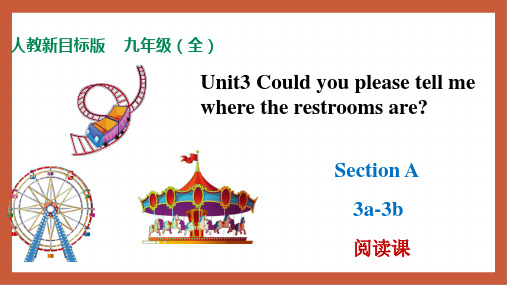Unit3sectionA
人教版英语八年级下册Unit3 SectionA 教材知识详解

Unit3 SectionA 教材知识详解1. Peter, could you please take out the rubbish? 彼得,请你倒一下垃圾好吗?(1) Could you please...?句意为“你……好吗?”,这是礼貌地提出请求的一种句型。
could不表示过去,而是表示委婉、客气、诚恳的语气,please后应接动词原形。
如:Could you please help me work out the math problem?你能帮我算出这道数学题吗?(2) take out the rubbish意为“倒垃圾”。
take out意为“拿出;取出”,其中out 是副词。
如果表示“把……从……拿出”常用take... out of…。
如:Take the rubbish out when you go out.出去时把垃圾倒掉。
2. sweep the floor 扫地sweep v.扫除;清扫;清除。
其过去式、过去分词均为swept。
如:Could you please help me sweep the floor?你能帮我扫一下地吗?3. make your bed 整理床铺make one’s bed意为“整理床铺”,也可以表达为make the bed。
如:I could make my bed when I was very young.我很小的时候就能整理床铺。
4. Sorry. I’m going to work on it now.对不起。
我现在就要用它工作。
work on是一个动词短语,on为介词,表示“从事某项工作;做某项工作/研究;创作作品、作画、开机器等”。
如:My father is an author. He is working on a new novel.我爸爸是一位作家。
他正在写一部新小说.(1) work hard at意为“努力学习,努力做”。
Unit3SectionA2d3c课件人教版七年级英语下册

3a Read the story and answer the questions.
1.Why was Nancy’s mom angry with her?
Because Nancy didn’t want to take the dog for a walk.
2. Did they solve the problem? How?
7:00 - 7:25
6:40 - 7:25
How do you get to school? I …
How long does it take?
It takes …
How farΒιβλιοθήκη is it?It’s about …
拓展 how引导特殊疑问句的其他常见用法如下:
询问程度、 你认为北京怎么样? 看法 How do you like Beijing? 今天的天气怎么样?
Unit 3 How do you get to school?
Section A (2d-3c)
Review
Look at the pictures and make up sentences.
I go to _________ by _____. I take ________ to the _____.
How do you get to school? I ride my bike.
How does she get to school? She usually takes the bus.
How long does it take to get to school?
It takes about 15 minutes.
It takes about 15 minutes.
人教版八年级上册英语Unit3_SectionA课件

Is Tom smarter than Sam?
Is Tara more outgoing than Tina? Are you as friendly as your sister? Does Tara work as hard as Tina? Who’s more hard-working at school?
No, he isn’t. Sam is smarter than Tom. No, she isn’t. Tina is more outgoing than Tara. No, I’m not. I’m friendlier.
Yes, she does.
Tina thinks she works harder than me.
smart funny work hard outgoing friendly sing well
Mother
√
Father
Oral practice
将获得的信息以独白的方式进行转述,比一比,看谁说的好
My neighbor is Liu Yang. He thinks…
Exercise
用所给词的适当形式填空。
1. Ann is a very _q_u_i_e_t _( quiet)girl, she hardly makes noise. 2. An elephant is much_h_e_a_v_i_e_r _(heavy)than a horse. 3. I hope our city get s more and _m_o_r_e_b_e_a_u_t_if_u_l(beautiful). 4. The moon looks _b_r_ig_h_t_e_r _(bright)than usual tonight. 5. Who sings _m__o_re__c_le_a_r_ly__(clearly),Lucy or Julie? 6. My uncle has_l_o_n_g_er_(long) hair than my father.
Unit 3(单元知识清单)-SectionA七年级英语上册(人教版)_1_1

Unit 3单元知识清单Section A二、知识点清单1. It’s in front of the art building.in front of 在......前面;强调在某人或某物外部的前面in the front of 在......前部;强调在某物内部的前面The girl is in front of the bus.The girl is in the front of the bus.反义词:behind 在......后面2. The student centre is between the library and the gym.between prep. 在......之间,一般指在两者之间,当后面接代词时用宾格。
搭配 between ... and ... 在......和......之间3. What’s your new classroom like, Peter?what’s ... like? ......是什么样子的?用来询问天气情况、事物的外观或人的外貌、性格等。
like此处作介词,意为“像”。
large adj. 大的,大号的多指面积、空间、范围、数量等大big adj. 大的多指体积、程度、分量或重量上的大,其反义词是little或small。
4.Yes, we put up important notices there.put up 张贴;搭建,举起important adj. 重要的常作表语,也可作定语,放在所修饰词前面。
notice v. 注意到;意识到此处可作可数名词,意为“通知”.5.There are some pictures of famous people on the wall.on the wall 在墙上;某物(粘贴)在墙的表面in the wall 在墙上;某物(镶嵌)在墙的内部The clock is on the wall.There is a window in the wall.5. The teacher's desk is in the corner, under/ in front of a window.in the corner 在角落at/ on the corner 在拐角处,在转弯处6.Students sit between/ on chairs at long tables, but today there aren't any students.at a/ the table 在桌子旁边吃饭at table 在吃饭table 供用餐、会谈或消遣娱乐所用,通常没有抽屉。
人教版七年级英语下册Unit3_SectionA_语境法讲解单词

Unit3 SectionA 语境法讲解单词
train /treɪn/ n. 火车
词形、词块拓展
live (1) __l_iv_i_n_g_____________ 派生词(生活;生计)
① _li_v_i_n_g__r_o_o_m_________ 客厅 ② _li_v_i_n_g__e_n_v_i_r_o_n_m__e_n__t 生活环境 ③ _li_v_i_n_g__c_o_n_d_i_t_i_o_n____ 生活条件 ④ _li_v_i_n_g__s_p_a_c_e________ 生存空间;居住面积 ⑤ _m_a__k_e__a_l_i_v_in__g______ 谋生
比较记忆 训练(train)大脑(brain)。
例句 We can catch the early morning train. 我们能赶上凌晨的火车。
train /treɪn/ n. 火车
① The athletes are training for the Olympics.
训练
② You can train your mind to think positively.
练练不忘
①Yang Jiang, a well-known writer, went 10 England for further (far) study
in 1935. ②—We're still expecting a new movie shown in the cinema. — As far as I know (据我所知), there are no more new movies this month. ③My home is not far from here (离这不远), and it won't take me much time to walk home. ④ So far (迄今为止), robots haven't caused any problems. ⑤Honesty is far more important than grade(远比……重要), so don't cheat in exams.
Unit3SectionA(3a3b)课件人教版九年级英语全册

Read part 4 carefully and finish the tasks.
a little earlier 早一点儿a little修饰比较级 earlier。比较级前常用much(……得 多),a little/a bit(一点儿),even(甚 至),still(更加)等修饰,表示程度。
人教新目标版 九年级(全)
Unit3 Could you please tell me where the restrooms are?
Section A 3a-3b
阅读课
Lead in
Where is it? What do you think of it?
➢ Have you ever tried these rides?
or hold my hand.
9/29/2023
17
Guide (3): Read and understand
10'
F(lu)nshToimutesatPsabr.k意—为A“lw冲a某ys 人a F大un声T叫im嚷e!”,
含欢有乐批[时A评l代ic、e公a园指nd责He Wei are in Space World.]
经过
on one’s way to … 在某人去……的路 上,后 here/there /home等地点副词时, 应去掉介词to。
Read the third scene and do true or false. 1. A rock band plays in Water City Restaurant every evening. F Uncle Bob’s 2. Alice and He Wei can go to the restaurant later. T Fill in the blanks.
人教版九年级Unit3 sectionA 课件(PPT)
Talk about the rules according to the pictures.
get your ear pierced pierce 刺穿,刺破
earring
Talk about the rules according to the pictures.
drive a car get your diver’s 执照 license
Talk about the rules according to the pictures.
have a part-time job
Talk about the rules according to the pictures.
not serious not old enough not calm enough
enough(足)够…… (1)enough +名词 enough people/water/time/money (2) 形容词+enough big/tall/serious enough
too wild enough too young too silly
1a
Circle “A” for agree or “D” for disagree.
A D 1. I think teenagers should be allowed to go out with
their friends every night.
A D 2. sixteen-year-olds should be allowed to drive. A D 3. Students should not be allowed to have a part-time job.
人教版九年级全册英语Unit3SectionA(3a3b)教学设计
五、作业布置
1.完成课后练习册中与本节课相关的内容,重点在于词汇填空、时态选择和句型应用,旨在巩固学生对课堂所学知识的掌握。
-请注意,此部分作业应侧重于学生对目标词汇和短语的理解与应用,以及对时态的正确运用。
2.结合课堂所学,写一篇关于自己近期目标的英文短文,要求至少80词,内容需包括:
-重难点时态:一般现在时、一般过去时
3.阅读理解:学生需要通过阅读3a和3b的文章,理解并分析作者的观点和意图,这对学生的阅读理解能力提出了较高要求。
(二)教学设想
1.针对词汇和短语的教学:
-采用实物展示、图片辅助、语境创设等方法帮助学生形象记忆词汇。
-设计词汇游戏和小组竞赛,激发学生学习词汇的兴趣和积极性。
4.小组合作任务:每组选择一个成员,采访该成员关于其个人目标的问题,并记录答案。采访结束后,小组共同整理采访内容,用英文撰写一份采访报告,并在下次课堂上进行分享。
5.观察并记录自己在接下来的一周内,为了实现个人目标所做出的努力和取得的进步。在下节课前,学生需要准备一个简短的口头报告,与同学分享自己的观察和感受。
人教版九年级全册英语Unit3SectionA(3a3b)教学设计
一、教学目标
(一)知识与技能
1.学生能够理解并熟练运用本章节所学的词汇和短语,如"goal, achieve, effort, success, fail, give up, practice, improve"等,提高学生的词汇量和语言表达能力。
(三ห้องสมุดไป่ตู้情感态度与价值观
1.培养学生树立目标意识,激发学生为实现目标而努力奋斗的积极性。
人教版七年级英语下册Unit3 Section A(1a-2d)课件
2a Listen. Peter asks his father if he can do four
things. What does his father say? Check ( ) “yes” or “no”.
Peter wants to… go out for dinner.
Peter’s father says…
Peter wan2tas .to…
Peter’s father says…
His father’s reasons
go out for dinner. Yes No
I have to do some work
go to the movies Yes No
You have to clean your room
—How do you get to school? —I ______ to schoole the bus
walk
1b Listen and write the numbers next to the
correct students in the picture.
Take out the rubbish,fold the clothes and do the dishes.
(2)Where do you think their mother is? At the supermarket.
(3)Who’s really the boss at home? Mother.
= I get to school on foot.
你学会了吗?
walk ride a bike take the subway take the train take the car take the bus take the boat
Unit3SectionA知识点复习与练习
Unit3SectionA知识点复习与练习Unit 3 Could you please clean your room?Section A 同步复习讲义一、基础巩固(一)速记单词:将下列单词的汉语意思写出,并注意单词的划分与划线部分。
1.rub—bish2.floor3.shirt4.fin—ger5.chore6.mess7.fold 过去式8.sweep 过去式9.throw 过去式10.pass 11.bor—row 12.lend 过去式13.hate 反义词14.nei—ther 15.while 16.频繁;反复17.一…就…;尽快(二)词组整理1.倒垃圾2.洗餐具3.叠衣服4.扫地5.整理床铺6.打扫客厅7.出去吃饭8.晚归;在外面待到很晚9.搭车10.需要吃早饭11.work on…12.have to clean your room13.help out with a few things14.看完这个节目15.两小时的电视16.买完东西回来17.放学回家/doc/6676f398f61fb7360a4c651a.htmle home from work______ __19.take the dog for a walk _______ __=walk the dog20. come over21.整天工作22.do house all night23.help out around the house 24.生气地回答25.惊讶地问26.需要分担家务27.买点喝的东西28.和朋友们闲逛29.pass me the salt =30.lend me some money =31.借那本书32.讨厌做家务33.帮我洗餐具34.尽量不让它变湿(三)句子提升1.---你能扫地吗/请你扫扫地,好吗?---好的,当然可以。
--- you ?---Yes,2.---你能洗盘子吗?我要打扫客厅。
- 1、下载文档前请自行甄别文档内容的完整性,平台不提供额外的编辑、内容补充、找答案等附加服务。
- 2、"仅部分预览"的文档,不可在线预览部分如存在完整性等问题,可反馈申请退款(可完整预览的文档不适用该条件!)。
- 3、如文档侵犯您的权益,请联系客服反馈,我们会尽快为您处理(人工客服工作时间:9:00-18:30)。
Pair work:
Who Peter Peter’s mother Peter’s father Peter’s brother Peter’s grandfather
Where
What
Where was/were_______when Miss Wang visited? What was/were _____ doing when Miss Wang visi visited? He was in the living room.
What was he doing when I visited?
He was watching TV when you visited. .
Where is Peter? He is in the bedroom.
Time(yester Your partner you day)
7:00pm
8:00pm
9:00pm
Class is over! Goodbye!
What is he doing ? He is sleeping .
Where was Peter when I visited? He was in the bedroom. What was he doing when I visited? He was sleeping when you visited.
I’m Peter. This is my home.
kitchen
Where is Peter’s mother? She is in the kitchen. What is she doing ? She is cooking dinner.
Where was Peter’s mother when I visited? She was in the kitchen.
Unit3
What were you doing when the UFO arrived?
Revision: What is she/he doing ?
Peter’s mother
Peter’s father
Peter
Peter’s brother
bedroom bathroom
living room
a UFO
Where were you when the UFO arrived?
Where were you when the UFO arrived?
d b a c e f
Listen to the reporter’s questions and circle the correct responses.
过去进行时
含义: 表示过去某个时刻正在进行的动作。 结构: be (was/were) + doing 例句:What were you doing at nine last night?
I was taking a shower at nine last night.
Groupwork: What were you doing at … last night?
Where is Peter’s brother? He is in the bathroom.
What is he doing ? He is taking a shower.
Where was Peter’s brother when I visited? He was in the bathroom.
What was he doing when I visited?
He was taking a shower when you visited.
I’m a barber.
Peter’s grandfather
Peter’s grandfather was in the barber shop when I visited. The boy was in the barber’s chair when I visited. He was cutting hair when I visited.
Listen and repeat:
Reporter: So, what were you doing when the UFO arrived? Girl: Well, I was standing in front of the library. Boy: I was sleeping late. Woman: I was cooking dinner. Reporter: How about you? Man1: I was getting out of the shower. Man2: And I was cutting hair.
Pair work:
barber
boy
man
young man
girl woman
A: Where was the girl when the UFO arrived? B: She was in front of the library. A: What was she doing when the UFO arrived? B: She was standing in front of the library.
What was she doing when I visited? She was cooking dinner when
you visited.
Where is Peter’s father? He is in the living room.
What is he doing ? He is watching TV.
